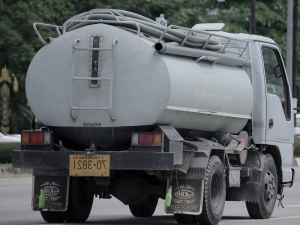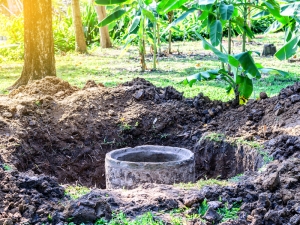There are several systems that are working behind the scenes of your home or business to ensure convenience. One of these systems is your cesspool. You probably don’t give much thought to flushing a toilet, taking a shower, doing a load of laundry, or washing the dishes. The water you use for these tasks simply goes down a drain, never to be seen again, right? Wrong!
While certainly, the goal is to never see that water again, all too often, business and homeowners not only end up seeing it, but they have to contend with the damage that it causes. A backed up cesspool can be a huge nightmare and a major inconvenience. It can cause flooding that can do extensive damage, you might be in need of a new cesspool installation; plus, there’s the matter of having to deal with raw sewage.
To put it mildly, a cesspool backup is something that nobody wants to deal with. In order to avoid an overflow, having a reputable cesspool company perform routine maintenance is vital.
How Often Does a Cesspool Have to be Pumped?
If your cesspool is in good condition (there aren’t any leaks or other damage), pumping is recommended every three to five years. However, there are several factors that can affect the frequency of pumping; for example, the on the amount of water the system is exposed to, as well as the size of the tank will impact how often pumping will be necessary. If your cesspool is on the smaller size or you have a large household, it will likely need to be pumped more often. Additionally, older cesspools tend to require more frequent pumping.
An experienced cesspool installer will be able to tell you exactly how often pumping should occur and will happily arrange a routine maintenance schedule to avoid potential problems.
Importance of Routine Cesspool Maintenance

If the wastewater from your home or business collects in a cesspool, having it maintained on a regular basis is vital. Here’s a look at some of the reasons why maintenance is so important.
- Ensures smooth operation. Regular cesspool maintenance ensures that everything in your home or business that uses water continue to operate properly. This includes toilets, showers, bathtubs, sinks, dishwashers and washing machines. Since the cesspool collects wastewater, pumping is necessary to prevent overflow. If the tank isn’t pumped, waste that has accumulated in it, as well as the wastewater, will eventually back up and impede the function of any elements that require drainage.
- Improves safety. A cesspool collects toxic wastewater and solid waste. If it overflows, the toxic waste could flow out into your yard or back into your home or business, creating highly unsanitary conditions that could potentially cause serious health complications. With routine pumping, the chances of being exposed to toxic waste will be reduced, thereby improving the safety of anyone in your home or workplace.
- Saves money. A lot of people are under the assumption that having their cesspool pumped and maintained is an unnecessary expense. In reality, however, maintenance will end up saving you a substantial amount of money in the long run. For example, if the system isn’t maintained, it could overflow or even collapse, repairs that have hefty price tags. Given how much routine maintenance can save you, it’s certainly an investment that is worth your while.
Additional Cesspool Maintenance

In addition to having your cesspool pumped and inspected by a reputable cesspool company, there are things that you can do between professional maintenance to avoid problems.
Some of the ways that you can keep your cesspool in good working condition include:
-
- Being mindful of parking and driving. Never drive or park a vehicle over the cesspool or drain field. The weight of a vehicle could cause severe damage; for example, the pipes could crack or the tank itself could collapse.
- Don’t install structures over the cesspool. Avoid building anything over the cesspool and its drain field. This includes patios, decks, walkways, driveways, sheds, garages or any other structure. The weight of the structure could be too much for the cesspool or pipes to bear, which could result in extensive damage. Moreover, pipes or the tank could be damaged during construction. Lastly, building anything over the cesspool and its components will make them inaccessible, which will impede maintenance and repairs.
- Watch what you flush. Certain items should never be flushed down drains and toilets. This includes anything that isn’t biodegradable, such as cigarette butts, diapers, latex, cotton swabs, paper towels, motor oil, grease, paint, and harsh chemicals. A good rule of thumb to keep in mind is this: if you can’t, won’t, or didn’t eat it, don’t flush it down drains or toilets. Flushing such items into your cesspool could lead to clogs and disrupt the balance of bacteria that break down organic matter, which will increase the chances of an overflow.
- Be mindful of water use. Using more water than your cesspool is designed to handle, or exposing it to a large volume at one time can also increase the risk of overflow. Avoid doing several loads of laundry in a single day, and don’t use several items that drain water at the same time. If possible, install low-flow fixtures, such as toilet bowls, showerheads, dishwashers and washing machines. These fixtures will significantly reduce the amount of wastewater that runs into the system.
- Watch stormwater runoff. You should also make sure that stormwater isn’t running off over, near or into the cesspool. For example, gutters should be directed away from the cesspool. One heavy rainstorm or rapid snowmelt could inundate a cesspool with water, which could cause an overflow.

Cesspool maintenance is vital for the health of your sewage removal system. If you are in need of maintenance and you live or work in the Smithtown area, contact Smithtown Cesspool at (631) 204-8836. We are located within close proximity to all points of interest in this Nassau County town, including the Smithtown Landing Golf Course and the Smithtown Bull. We also offer emergency service 24 hours a day, 7 days a week. No matter what your cesspool needs may be, you can count on Long Island Cesspool to handle them quickly, efficiently, and affordably.
